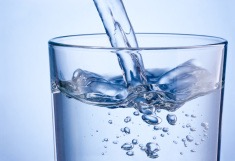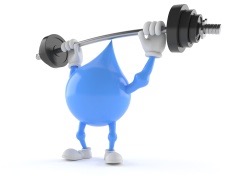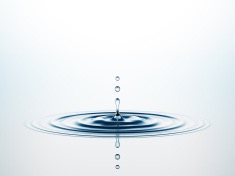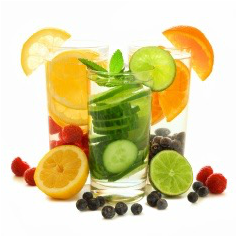|
As I am listening to the Microbiome Medicine Summit today, I am reminded of the importance of pure water. I wrote a previous blog post about digestion, which mentions how pure water helps rid the body of waste; however, water does so much more than that. What does water do for my body? Water is a nutrient essential to life. It is the primary component of all bodily fluids - blood, lymph, digestive juices, urine, tears, and sweat - and is involved in almost every bodily function. Water makes up 60% of our total body weight and is second in importance only to air for sustaining life. It is impossible to live for more than a week without it. Some uses of water  Regulates the body’s temperature Cushions and protects vital organs Lubricates and cushion the joints Aids the digestive system Helps with weight loss Acts within each cell to transport nutrients and dispel waste Gets rid of wastes through urination, perspiration, and evacuation Must I get all of my fluids from water? You can become hydrated in a number of ways, but water is the best fluid replenisher for most individuals. Other beverages that may be hydrating are herbal teas, juices, smoothies, coffee, soda or energy/sports drinks. Some view these beverages as fine substitutes because they contain water, but beware. Coffee is a diuretic and in excess can cause us to excrete more water than it contains. Soda, juices, and energy/sports drinks contain much sugar, which upsets water balance. Also, sugar sweetened beverages provide empty, unneeded calories. In addition to drinking water, you can get hydration from fruits and vegetables like watermelon, cucumber, tomato, lettuce, and celery. Should I drink only when thirsty?  Thirst is not fully reliable. Thirst is a signal that your body is already on its way to dehydration. It is important to drink more than thirst demands and continue to drink throughout the day. Dehydration Without enough water, we literally dry ourselves out. Dehydration is linked to chronic health problems like arthritis, diabetes, colitis, high blood pressure, kidney stones, and multiple sclerosis. Dehydration symptoms  Dark urine / constipation Dry skin / dry mouth Extreme thirst Dizziness / fatigue How much do we really need? Water requirements vary greatly from person to person and depend on the climate in which we live, our activity level, and our diet. However, a water goal would be to divide your body weight (in pounds) by 2. Aim to drink that many ounces of water daily. If you weigh 160 pounds/2 = 80 = ounces of water needed daily. Add an additional 8 ounces for every half-hour of exercise. Tips for reaching daily water goals
Don’t like the taste of plain water? Infuse your water with flavors, like cucumbers, strawberries, lemons, or fresh herbs. A water pitcher infused with fruit is great to have on hand. Sources:
American Council on Exercise. (ACE). (2008). Fit facts: Healthy hydration. Family Doctor. (2011). Hydration: Why it’s so important. Retrieved from: http://bit.ly/1i12PLi Haas, E. (2005). Staying healthy with nutrition. Berkeley, CA: Celestial Arts. Healthy Living for Life. (2011). Water education. Retrieved from: http://bit.ly/1lDcd5f Oz, M. (2010). How to read your pee. Retrieved from: www.doctoroz.com/videos/how-read-your-pee
1 Comment
2/11/2021 02:27:16 am
Water is a very important part of our lives. Water is like the geometry homework solver for our complicated math equation that we call life. It is the mare essence of us and our existence.
Reply
Leave a Reply. |
The information on this website is not intended to diagnose, treat, prevent, or cure any disease.
All of the information on this website is Copyright © CookingwithKristin.com 2017 and may not be downloaded, reproduced, republished or otherwise copied without express written permission of CookingwithKristin.com.
All of the information on this website is Copyright © CookingwithKristin.com 2017 and may not be downloaded, reproduced, republished or otherwise copied without express written permission of CookingwithKristin.com.
